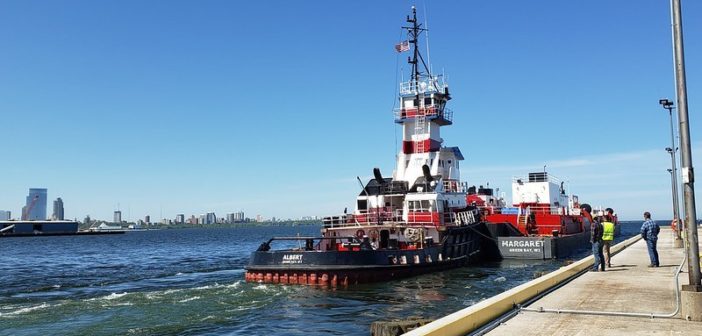After weeks of on-again/off-again negotiations, Congress finally reached agreement on a massive legislative package to fund the federal government for FY2021. The legislation was approved by the House and Senate late Monday night.
Among the bill's many provisions is the entire text of the Water Resources Development Act of 2020, and FY2021 appropriations for key Great Lakes programs.
Water Resources Development Act of 2020
Due to some last-minute tinkering by legislators, the final text of WRDA 2020 is somewhat different than the House-Senate conference agreement released in early December. The bill provides that no less than 13% of annual expenditures from the Harbor Maintenance Trust Fund (HMTF) be dedicated to Corps of Engineers' maintenance projects in the Great Lakes region. For reference, in 2019 Great Lakes projects received 9.8% of total expenditures. These additional funds are badly needed to address the $550 million backlog of Corps maintenance work in the Great Lakes.
In addition to the regional percentage, the bill expands a provision enacted by Congress last May which provides special budgetary treatment for expenditures from the HMTF. The new provision allows special treatment for appropriations up to the sum of HMTF tax and interest deposits two years prior, plus, an additional amount designated in the WRDA legislation as follows: $500 million in FY2021, $600 million in FY2022, $700 million in FY2023 — with a $100 million upward adjustment annually until reaching $1.5 billion in FY2030.
The goal of this language is to encourage House and Senate appropriators to start spending down the $10 billion excess balance currently in the HMTF.
Should all these provisions work as envisioned, annual spending on harbor maintenance should increase considerably with the Great Lakes region getting at least 13% of the total each year.
Key Great Lakes Maritime Appropriations Finalized
The massive package also includes all 12 of the regular appropriations bills that fund the various agencies and programs of the federal government for FY2021. The final funding levels for key Great Lakes maritime priorities are as follows: Soo Lock Construction — The final agreement provides a total of $123.22 million in FY2021 for ongoing construction of the new large navigation lock at Sault Ste Marie, Mich. The legislation also includes an additional $59.2 million for construction of "locks not on the inland waterway system." This strange wording is likely an effort by legislators to steer additional money to the Soo Lock project without violating Congressional earmarking rules. The Soo Lock project will most likely get some if not all of this $59.2 million. Finally, the agreement also includes $390 million of additional construction funds for the Corps to assign to navigation projects at its discretion. It is possible that some of these funds will also be assigned to the Soo Lock project. The final FY2021 total for Soo Lock construction will be announced in the Corps' FY2021 workplan, which will be released in late February or early March.
New Icebreaker Construction
The final agreement includes $4 million within the U.S. Coast Guard's budget to continue design work on a new heavy icebreaker for the Great Lakes.
Port Infrastructure Development Grants
The final agreement includes $230 million within the Maritime Administration's budget for Port Infrastructure Development Program (PIDP) Grants in FY2021. The House had provided $300 million and the Senate had provided $200 million. Congress funded the program at $225 million last year. The PIDP program is the only dedicated federal assistance program specifically for port infrastructure.
Saint Lawrence Seaway Development Corporation
The final agreement includes $38 million for the Saint Lawrence Seaway Development Corporation. This is the same funding level as last year. As was the case last year, the final appropriation includes an extra $2 million for enhanced navigation system marketing activities during FY2021. The House had included an additional $4 million for marketing. The Senate had not included any additional marketing funds.




